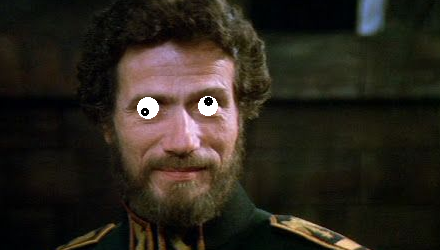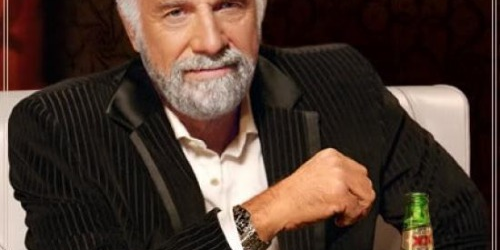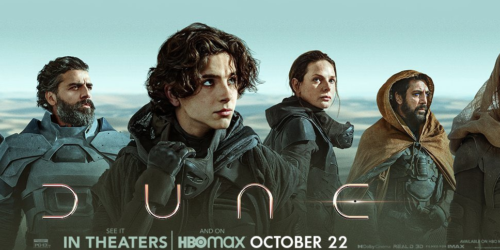Dune – A Spicy Hot Take
Nate and I always get a little nervous when our recorded conversations start to head into territory that could be considered “political”. The internet can be fickle and unforgiving when it comes to these topics. Unfortunately, Dune is one of those books that is inherently political. If you happened to listen to the outtake section of the first episode in our Dune series, and you were able to decipher it, then you may have realized that a lengthy discussion regarding Paul’s status as a “Mary Sue” and “White Savior” was cut. This was cut mainly for time, but also because our points weren’t very fleshed out and I thought that the conversation deserved a little more attention.
Last year Noah Berlatsky wrote an article for The Escapist entitled “Dune’s Paul Atreides Is The Ultimate Mighty Whitey.” To paraphrase the article, Paul is a naturally gifted individual who fulfills not one but two prophecies, and winds up living with a mysterious/exotic people, and then by force of his sheer all-encompassing talent becomes their God-King. Through acceptance of the native culture Paul becomes superior to both the natives and the folks back home. Paul is also literally a white savior to the Fremen (coded Middle-Eastern) of Dune. Looking into the Mighty Whitey trope it seems to be very similar to the White Savior trope.
The “White Savior” terminology is the one that I’m more familiar with.
A White Savior film is often based on some supposedly true story. Second, it features a nonwhite group or person who experiences conflict and struggle with others that is particularly dangerous or threatening to their life and livelihood. Third, a White person (the savior) enters the milieu and through their sacrifices, as a teacher, mentor, lawyer, military hero, aspiring writer, or wannabe Native American warrior, is able to physically save—or at least morally redeem—the person or community of folks of color, by the film’s end. Examples of this genre include films like Glory (1989), Dangerous Minds (1996), Amistad (1997), Finding Forrester (2000), The Last Samurai (2003), Half Nelson (2006), Freedom Writers (2007), Gran Torino (2008), Avatar (2009), The Blind Side (2009), The Help (2011)
Hughey, Matthew W. (January 19, 2015). “The Whiteness of Oscar Night”. Contexts. Retrieved July 22, 2016.
This type of narrative is problematic because it drastically over-simplifies, sometimes even endorses, oppression and colonization. Dune certainly fits most of the criteria that Matthew Hughey lays out.
In Dune, the Fremen seem to want to rid themselves of an imperial presence on Arrakis. I say “seem to want,” because what the Fremen are actually hoping to achieve is always given to us through an ex-imperial mouth piece. When the Atreides arrive, the Fremen are following Liet Kines. Shortly after that they follow Paul. The Fremen have built all the tools they need to free themselves, all they lack is a “civilized” person to show them how to use these tools.
Paul (and others from the Empire) have quite literally colonized Arrakis for the expressed purpose of mining its most precious natural resource. Paul does eventually conquer the evil empire, but not out of any love for the Fremen. Paul’s family had planned on using the Fremen as pawns in their political game from the very beginning. Paul merely follows through on that plan. The Fremen are tools in Paul’s quest for revenge. In the end, the Fremen exchange one emperor for another. They do not rule Arrakis, Paul does. This is portrayed as a good thing, and Paul is literally worshiped by the Fremen not just as a hero, but as a God. This is all pretty damning evidence that Frank Herbert either didn’t think or didn’t care about the real-life implications of depicting someone like Paul as a cool hero.
Even as a fan of Dune, I have to admit that I can see how readers have come to this conclusion. What I think may be missing from this reading is that Paul’s too-cool-for-school characterization and white savior narrative arc were written to illustrate the dangers of allowing society to fall into the hands of a single charismatic leader. Frank Herbert is aware of the issues with white saviors, and all heroic narratives for that matter. His decision to depict Paul as a hero was made with the intention of showing how insidious this kind of leader can be.
There is evidence to support this in the text. For example, Paul shamelessly manipulates the Fremen into thinking he is a divine being to secure their loyalty.
“The Fremen have a simple, practical religion,” he said.
“Nothing about religion is simple,” she warned.
But Paul, seeing the clouded future that still hung over them, found himself swayed by anger. He could only say: “Religion unifies our forces. It’s our mystique.”
“You deliberately cultivate this air, this bravura,” she charged. “You never cease indoctrinating.”
“Thus you yourself taught me,” he said.
Herbert, Frank. Dune (pp. 620-621). Penguin Publishing Group. Kindle Edition.
There are several points in the book where it is hinted that Paul may not be the prophesied savior that we think he is, and that he is actually a much darker entity.
In the beginning Paul senses that he has a terrible purpose. He knows that his actions will lead to a devastating war, encompassing all of humanity. Before coming into his full powers he resists this destiny. It scares him that he could be capable of something like this.
He found that he no longer could hate the Bene Gesserit or the Emperor or even the Harkonnens. They were all caught up in the need of their race to renew its scattered inheritance, to cross and mingle and infuse their bloodlines in a great new pooling of genes. And the race knew only one sure way for this—the ancient way, the tried and certain way that rolled over everything in its path: jihad.
Surely, I cannot choose that way, he thought.
But he saw again in his mind’s eye the shrine of his father’s skull and the violence with the green and black banner waving in its midst.
Herbert, Frank. Dune (pp. 323-324). Penguin Publishing Group. Kindle Edition.
We learn from the chapter headings that Paul’s conquest isn’t just bloody. It’s macabre.
Remember, we speak now of the Muad’Dib who ordered battle drums made from his enemies’ skins, the Muad’Dib who denied the conventions of his ducal past with a wave of the hand, saying merely: “I am the Kwisatz Haderach. That is reason enough.”
Herbert, Frank. Dune (p. 757). Penguin Publishing Group. Kindle Edition.
As time goes on, Paul begins to lose his empathy for humanity. After his son is killed by the emperor’s troops, he even takes a small amount of joy in the pain and suffering he is about to cause.
Everything he touched brought death and grief. And it was like a disease that could spread across the universe.
He could feel the old-man wisdom, the accumulation out of the experiences from countless possible lives. Something seemed to chuckle and rub its hands within him.
And Paul thought: How little the universe knows about the nature of real cruelty!
Herbert, Frank. Dune (pp. 739-740). Penguin Publishing Group. Kindle Edition.
Lindsay Ellis is an author and video essayist who has a wonderful piece “Mel Brooks, The Producers, and The Ethics of N@zi Satire” that I highly recommend everyone watch. She discusses some of the problems of satire that portrays neo-nazi’s as bad, but also kind of bad-ass. I think this is a trap that Herbert may have fallen into with his first Dune novel. We don’t notice Paul’s dark turn because he is supposed to be inherently attractive to us. We’re supposed to like and empathize with Paul. When Paul’s son is killed and Paul embraces the jihad and smiles at the cruelty he’s about to unleash, our first thought is not “Well, that’s a bit dark.” Instead we share his anger. We want justice for Paul, and we want the Harkonnens and the Emperor to suffer. We’re not thinking about the billions and billions of people who will be caught up in Paul’s jihad.
Frank Herbert wanted to show you how easy it is for a charismatic leader to entice anyone to atrocity, even you, Dear Reader. Unfortunately, that point is never driven home in Dune’s text. Dune ends with Paul killing Feyd-Rautha, a complete sadist, and dethroning a treacherous emperor. We never see the consequences of our endorsement of this hero. The book ends before the true horrors take place.

In the afterword to my copy of Dune, Brian Herbert explains that many fans and one of the original editors failed to understand Frank Herbert’s message in Dune. As a result, many were very surprised by the direction that Dune Messiah would take. Dune Messiah makes the message very explicit: Paul is kind of a bad guy.
In 1969, Frank Herbert published the first sequel, Dune Messiah, in which he warned about the dangers of following a charismatic leader and showed the dark side of Paul Atreides. Many fans didn’t understand this message, because they didn’t want to see their superhero brought down from his pedestal. Still, the book sold well, and so did its predecessor. Looking back at Dune, it is clear that Dad laid the seeds of the troublesome direction he intended to take with his hero, but a lot of readers didn’t want to see it. John W. Campbell, the editor of Analog who made many useful suggestions when Dune was being serialized, did not like Dune Messiah because of this Paul Atreides issue.
Herbert, Frank. Dune (p. 871). Penguin Publishing Group. Kindle Edition.
I’m not going to go into great detail on the examples of Paul’s many atrocities in Dune Messiah, as we are considering doing this for the podcast at some point, but suffice it to say that Dune Messiah does a complete 180 on the hero’s journey. Paul’s journey is over, now we get to see what treasure he found, and what he does with it.
So, is Dune a White Savior Narrative or not?
My answer is yes, but also no? It is literally the story of a white savior, but it was intended to deconstruct the idea of saviors entirely. Unfortunately, intentions are only part of the equation. For a large number of readers Dune’s attempt at satire was indistinguishable from sincerity. Dune is a long, perhaps even bloated, book. I think it would have served the novel’s themes better if Herbert had devoted less page time to Count Fenring and Feyd-Rautha and more time to the struggle raging within Paul. At the very least, we should have seen some humanitarian consequences of Paul’s war. This is a mistake that Herbert corrects in later novels, but the damage was done. Dune isn’t widely thought of as a series in the way that Lord of the Rings is. In the minds of many readers, Dune Messiah is not part 2 of a series in which all parts must be read to get the full picture. It is a sequel to the self-contained Dune narrative. If we look only at the text of Dune itself we can certainly see some evidence suggesting a darker turn in Paul’s future, but it’s hard not to see him as a legitimate savior as well.
With the new movie coming out, I’m sure this discussion is going to be brought up. Hopefully we can continue to have a civil discussion about these things. I suspect Frank Herbert would be glad that we’re having it. I just wanted to take this opportunity to throw in my two-cents as a Dune fan, and to provide some context for people who haven’t read the books, or have only read the first one.






